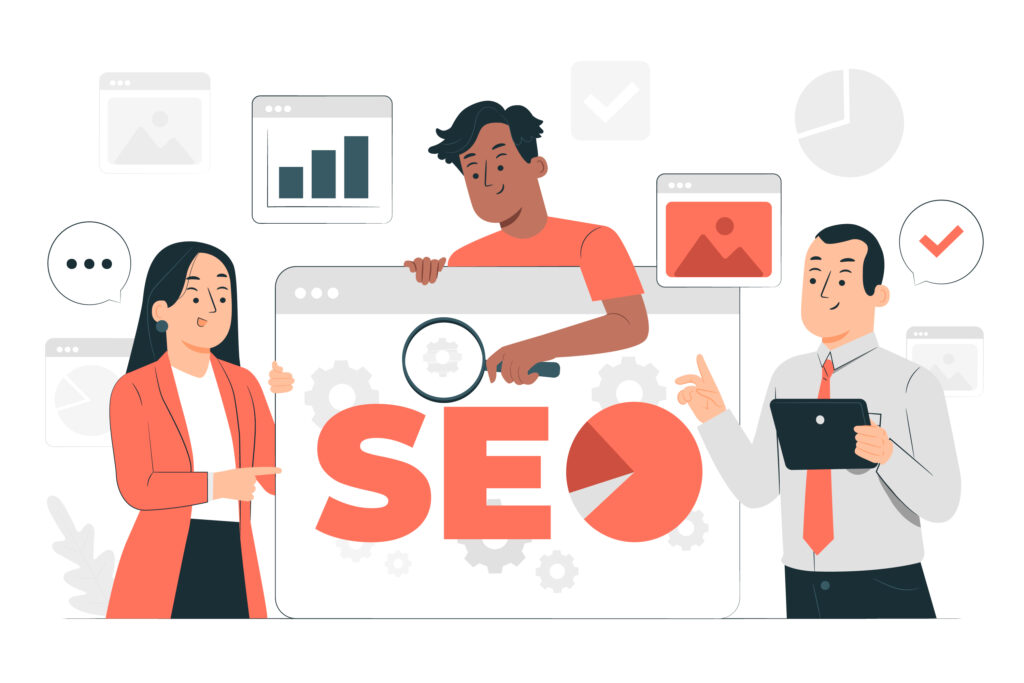When you’re running an eCommerce store, driving traffic to your site is just half the battle. The real challenge lies in turning that traffic into paying customers. That’s where the power of Search Engine Optimization (SEO) comes in. If you are asking how to use SEO for ecommerce, it’s not just about boosting visibility or climbing to the top of search engine results pages (SERPs); it’s about attracting the right kind of traffic – visitors who are genuinely interested in what you’re selling.
Now, you might be thinking, ‘SEO sounds complicated. I don’t know the first thing about keywords or backlinks.’
But here’s the good news: mastering SEO for eCommerce isn’t as daunting as it seems. In fact, with a bit of know-how and strategic thinking, you can leverage SEO to attract high-quality traffic to your online store, increase conversions, and boost your bottom line.
So, let’s debunk the mystery and make SEO work for you!
Understanding the Importance of SEO for eCommerce
You might wonder, why is SEO so important for your eCommerce business? Let’s delve into this crucial topic and discover how it can dramatically boost your online visibility and sales.
SEO, or Search Engine Optimization, is the process of enhancing your website so that it ranks higher in search engine results. When your eCommerce site ranks higher, it’s more likely to be seen by potential customers. Imagine your eCommerce site as a physical store – SEO is like placing your store at the busiest intersection in town. The more people who see your store, the more traffic you get and the more sales you make.
Not convinced yet? Consider this. SEO is one of the most cost-effective marketing strategies out there. Unlike paid advertising, where you spend money to have your ads shown, SEO is all about organic growth. It’s about making your site more appealing to search engines, so they’ll naturally rank it higher. Think of it as a long-term investment. Sure, it takes time and effort, but once you’re at the top, you’ll reap the benefits without spending a dime on advertising. Plus, customers trust and prefer organic search results over paid ads.
SEO is not just about driving traffic to your site; it’s about attracting the right kind of traffic. With SEO, you can target specific keywords related to your products or services. This way, you’re not just getting any traffic; you’re getting qualified traffic – people who are actually interested in what you’re selling.
So, to answer your initial question, SEO is necessary for your eCommerce business because it increases your visibility, brings you cost-effective growth, and attracts the right audience. It’s not just about being seen; it’s about being seen by the right people.
Conducting Keyword Research for Your Online Store
Diving into keyword research for your online store, aren’t you? It’s an essential step in the journey of getting your products noticed by the right customers.
Picture this, you’ve got the perfect product, a stunning website, and an unbeatable price, but without the right keywords, your potential customers won’t have any way to find you. It’s like having an amazing party but forgetting to send out the invites.
Keyword research is your way of sending those invites out, guiding the search engines to your virtual door.
Why is keyword research so important? Because it helps you understand the language of your potential customers. It’s not about what you think they’re searching for; it’s about knowing exactly what they are typing into that search bar.
By identifying the right keywords, you’re tapping into the mindset of your customer. This means you can tailor your products, descriptions, and content to match their needs and wants. You’re not just guessing; you’re strategically placing your business in their path.
So, how do you conduct keyword research? First off, start by brainstorming a list of words and phrases related to your products. Dive deep into your industry and think about all the possible ways someone might search for what you offer.
Then, use keyword research tools like Google Keyword Planner or SEMrush to find out which of these keywords have a high search volume. Remember, the key is to find high-volume, low-competition keywords that will help you rank higher in search results.
Don’t overlook long-tail keywords, these specific phrases may have lower search volumes, but they could lead to higher conversion rates.
So go on, harness the power of keywords to drive relevant traffic to your online store. It’s not just about visibility; it’s about getting the right kind of visibility.
Optimizing Your Product Pages for Search Engines
Optimizing product pages for search engine visibility isn’t about stuffing as many keywords as possible into your content. Rather, it’s about strategically placing these keywords in a manner that appears natural and enhances the readability of your content.
This involves incorporating keywords into your product titles, descriptions, meta descriptions, and image alt tags. Always keep in mind that your ultimate goal is to provide value to your users, not just to rank higher on search engine results pages.
Engaging, high-quality content is your most powerful tool when optimizing your product pages. Use this opportunity to tell a story about your products. What makes them unique? What problems do they solve? How will they enhance the lives of your customers? By answering these questions, you not only enhance your SEO but also build an emotional connection with your customers, increasing the chances of them making a purchase.
Avoid generic product descriptions and remember that SEO is a long-term strategy. It takes time to see results and requires consistent effort and continuous monitoring and tweaking. Your product pages should be dynamic, not static. This means regularly updating your content to keep it fresh and relevant. Use analytics to track your progress and make necessary adjustments.
By doing so, you’ll not only improve your search engine rankings but also create a better shopping experience for your customers.
Building Quality Backlinks to Your eCommerce Site
Building quality backlinks to your online store’s site isn’t simply about quantity; it’s the quality of those links that truly matters. You want to attract links from reputable websites that are related to your industry or niche. These backlinks signal to search engines that your site is trustworthy and relevant, helping to boost your SEO ranking.
Ditch the old concept of flooding the internet with low-quality links and focus on building meaningful relationships with high-authority websites. Now, you might be wondering how to get these quality backlinks. Start by creating valuable content that others will want to link to. This could be a well-researched article, an informative infographic, or an engaging video.
By providing content that adds value to your audience, you’re more likely to attract high-quality backlinks. You can also reach out to bloggers and influencers in your industry, offering them your product for review. When they write about your product and link back to your site, it’s a win-win for both parties: they get content for their site, and you get a quality backlink.
Don’t overlook the power of social media in your backlink-building strategy. Sharing your content on platforms like Facebook, Twitter, and LinkedIn can increase its visibility, making it more likely to be linked to.
Remember, building backlinks isn’t a one-time task; it’s an ongoing process that requires consistent effort. So, roll up your sleeves, create that killer content, and start building those quality backlinks today. Your eCommerce site’s SEO ranking will thank you for it.
Analyzing Your SEO Performance and Making Improvements
Once you’ve put in the hard work of creating high-quality content and building backlinks, it’s time to take a step back and evaluate how well your efforts are paying off. By analyzing your SEO performance, you can identify areas of strength and weakness, and make necessary adjustments to improve your eCommerce site’s visibility and reach.
Don’t fear, this isn’t as daunting as it sounds. You can use numerous SEO tools available that can provide you with detailed insights on your site’s performance.
Keeping an eye on your site’s ranking for specific keywords is crucial. However, don’t just stop there; delve into other significant factors like your site’s loading speed, bounce rate, and conversion rate.
For instance, if your site takes too long to load, visitors will likely leave before they even have a chance to see your products. Or if you notice that your bounce rate is high, it could mean that people are not finding what they’re looking for on your site. These indicators can provide you with valuable information about your audience’s behavior and preferences, helping you fine-tune your strategy to better meet their needs.
Now, you’ve got the information and the tools, the next step is to make improvements. Based on your analysis, focus on the areas that need the most attention.
If your site’s loading speed is an issue, work on optimizing your images and enabling browser caching. If your bounce rate is high, consider revamping your site’s design or improving your content to make it more engaging and relevant.
Remember, SEO isn’t a one-time task but rather a continuous process of analysis, adjustment, and improvement. Your eCommerce success depends on your ability to adapt and evolve with the changing digital landscape. So, keep testing, keep analyzing, and keep improving.
Frequently Asked Questions
What is the role of social media in eCommerce SEO?
“Social media plays a pivotal role in eCommerce SEO. It boosts your brand’s visibility, drives traffic to your site, and enhances customer engagement. You’re not just selling products, you’re building a community online.”
How does the website’s page loading speed affect SEO?
Your website’s page loading speed significantly impacts SEO. If it’s slow, users may leave, increasing your bounce rate. Google considers this when ranking sites. So, a faster loading speed boosts SEO, keeping visitors engaged longer.
How can I use SEO to increase the conversion rate in my eCommerce store?
Boost your ecommerce store’s conversion rate with SEO by focusing on keywords, product descriptions, and user experience. Craft compelling meta descriptions and titles. Optimize site speed and mobile experience. Create valuable, unique content regularly.
Can I use SEO strategies to improve the user experience on my eCommerce site?
Absolutely! SEO strategies can significantly enhance your ecommerce site’s user experience. By optimizing product descriptions, improving site navigation, and speeding up page load times, you’ll keep visitors engaged and likely to return.
How to manage SEO for multilingual eCommerce sites?
Absolutely! Manage SEO for multilingual ecommerce sites by creating unique, keyword-rich content for each language. Utilize hreflang tags for language targeting and ensure your site structure is language-friendly. It’s a game-changer!
Conclusion
In conclusion, now that you have learned how to use SEO for ecommerce, you now understand that mastering SEO for your eCommerce store isn’t a luxury, it’s a necessity. It’s time to step up and embrace the power of keywords. Optimize those product pages and start building quality backlinks.
Don’t just sit back and hope for the best. Analyze your SEO performance, make improvements, and watch as your online store climbs search engine rankings. Trust us, your bottom line will thank you.
Now, go forth and conquer the SEO world!




